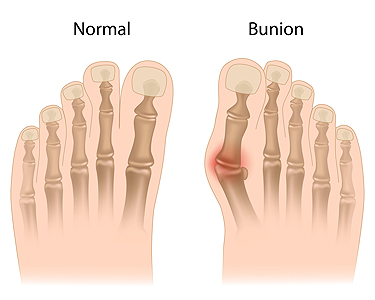
Bunions are a foot deformity characterized by a noticeable bump at the base of the big toe, where it angles towards the second toe. This deformity results from an imbalance in the bones and ligaments of the foot. Symptomscan typically include localized pain, swelling, and redness at the site of the bunion. The affected toe may also become stiff, making it difficult to wear shoes comfortably or walk without discomfort. Several factors contribute to the development of bunions. Genetics play a significant role. If bunions run in your family, you are more likely to develop them. Wearing tight, narrow shoes can worsen the condition by putting pressure on the toes. Other contributing factors can include arthritis and structural abnormalities in the foot. If you are experiencing some of these symptoms, it is suggested that you schedule an appointment with a podiatrist who can diagnose and offer a comprehensive treatment plan.
If you are suffering from bunion pain, contact Landon Bowerbank, DPM of Pioneer Foot and Ankle. our doctor can provide the care you need to keep you pain-free and on your feet.
What Is a Bunion?
Bunions are painful bony bumps that usually develop on the inside of the foot at the joint of the big toe. As the deformity increases over time, it may become painful to walk and wear shoes. Women are more likely to exacerbate existing bunions since they often wear tight, narrow shoes that shift their toes together. Bunion pain can be relieved by wearing wider shoes with enough room for the toes.
Causes
- Genetics – some people inherit feet that are more prone to bunion development
- Inflammatory Conditions - rheumatoid arthritis and polio may cause bunion development
Symptoms
- Redness and inflammation
- Pain and tenderness
- Callus or corns on the bump
- Restricted motion in the big toe
In order to diagnose your bunion, your podiatrist may ask about your medical history, symptoms, and general health. Your doctor might also order an x-ray to take a closer look at your feet. Nonsurgical treatment options include orthotics, padding, icing, changes in footwear, and medication. If nonsurgical treatments don’t alleviate your bunion pain, surgery may be necessary.
If you have any questions, please feel free to contact our office located in Lehi, UT . We offer the newest diagnostic and treatment technologies for all your foot care needs.




